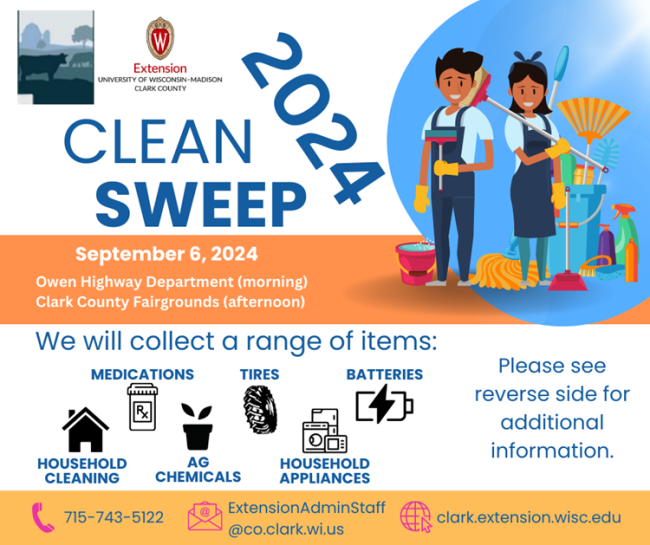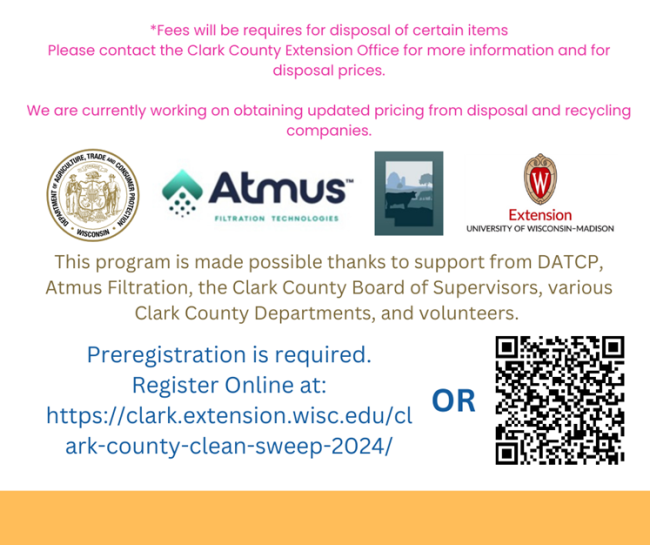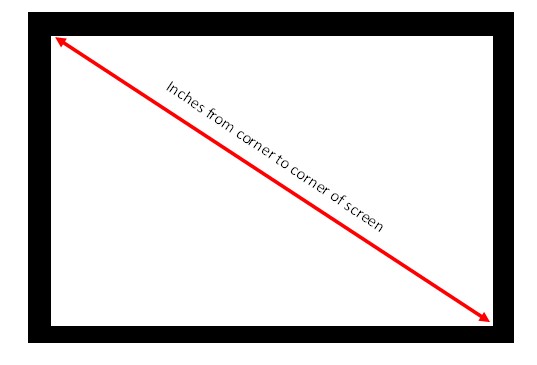

Clark County is hosting a Clean Sweep event on Friday, September 6, 2024. We will have two drop off locations.
9:00 -11:00 a.m. = Owen site of the Clark County Highway Department, and
1:00 – 3:00 p.m. = Clark County Fairgrounds in Neillsville
Brochure.pdf (1,303 KB)
Register online using Google Forms
2024 Clark County Ag & Household Clean Sweep Tire, Battery, & Appliance Collection
What Is Clean Sweep?
Clark County’s Agricultural & Household Clean Sweep program will give farmers and residents an opportunity to dispose of hazardous chemicals to help protect our surface and groundwater.
Why Is the Clean Sweep Necessary?
The average U.S. citizen generates somewhere between 6 and 15 pounds of household hazardous waste annually. Applying those rates to Clark County’s 34,774 residents, our county generates between 208,644 to 521,610 pounds of household hazardous waste each year.
What Are Waste Chemicals?
Chemicals become waste when they are no longer wanted or when they can no longer be used. Waste pesticides include banned products, products damaged during storage or by contamination, outdated or surplus amounts of products, and products which are no longer in use because they have been replaced by more effective products.
How Is Hazardous Waste Identified?
Hazardous waste can usually be identified by product labels which contain words like: caution, warning, danger, poison, toxic, ignitable or flammable, acid, corrosive, or reactive.
How Much Waste Can I Bring?
To ensure fair access and the widest possible participation by all Clark County residents, the following limits have been established:
Agricultural: Farmers and farm households will be allowed to bring a total of 200 pounds of hazardous waste. Any amounts above 200 pounds will be charged $2.00/lb. DO NOT MIX LIQUIDS and/or SOLIDS.
Household: Each household may bring up to and no more than a combination of 5 gallons of liquid OR 50 pounds of solid hazardous waste. Any amounts above these quantities will be charged $2.00/lb. DO NOT MIX LIQUIDS and/or SOLIDS.
Batteries (car and rechargeable): No limit.
Tires and Appliances: No limit—fee required.
SEPARATE FARM AND HOME HAZARDOUS WASTE
What you CAN bring to Clean Sweep…
The following items are accepted at Clean Sweep.
Please note, there may be disposal costs associated with some items. They will be posted as soon as we have the correct information.
- Agricultural – fungicides, herbicides, insecticides, rodenticides, captan, parathion, toxaphene, heptachlor, lindane, 2,4,5-T/Silvex, dioxin products, poisons, animal health products, acid washes, sanitizers. DO NOT MIX LIQUIDS and/or SOLIDS.
- Appliances – televisions, refrigerators, washing machines, air conditioners, central heating/cooling units, heat pumps, computers & related equipment, microwaves, freezers, dryers, sump pumps, copiers, heat lamps, stoves/furnaces, dehumidifiers, and hot water heaters.
- Automotive – engine & carburetor cleaners, fuels, ether, brake, transmission & hydraulic fluids, vehicle batteries, and tires.
- Batteries – motorcycle, lawn mower, auto, truck, and tractor.
- Household – air fresheners, moth balls, drain & oven cleaners, dry cleaning fluid, spot remover, mildew cleaner, paints (oil and lead), peroxide, swimming pool chemicals, and floor, silver & furniture polishes, thermostats (in plastic bag/container).
- Lawn & Garden – insect repellent, arsenic, insecticide, chlordane, DDT, malathion, pesticide, poison, fungicide, rodent & slug bait, herbicide, and 2-4-D.
- Medication – all medications (in original containers—cross off personal names), thermometers (in plastic bag/container); no needles allowed.
- Tires – passenger, truck, and tractor NO RIMS ACCEPTED / empty water from tires Unknown chemicals greater than 5 gallons or 50 pounds.
- Workshop – glue, stripper, gun cleaning fluids thinner, lacquer, turpentine, lead-based & oil paints, varnish, pentacholorphenol (“Penta”), and wood preservatives containing PCP’s.
- Well Pumps
Agricultural: Farmers and farm households will be allowed to bring a total of 200 pounds of hazardous waste. Any amounts above 200 pounds will be charged $2.00/lb.
Household: Each household may bring up to and no more than a combination of 5 gallons of liquid OR 50 pounds of solid hazardous waste. Any amounts above these quantities will be charged $2.00/lb.
DO NOT MIX LIQUIDS and/or SOLIDS.
What you CANNOT bring to Clean Sweep…
Due to restrictions imposed by the hazardous waste disposal company and the Environmental Protection Agency, the following cannot be accepted:
- Waste motor oil & antifreeze (see automotive garage for collection alternatives)
- Batteries – household (AA, D, etc.)
- Propane cylinders Explosives (ammunition & fireworks)
- Infectious & biological waste (medical, etc.)
- Radioactive materials (smoke alarms)
- Needles
- Latex paint (to discard open the can and allow to dry out and then dispose of in regular garbage. For large volume dump in another container to increase surface area to dry out.)
Disposal Prices
There are costs associated with select items. These are items that other county clean sweeps do not accept do to the additional costs. We provide the convenience of a one stop disposal, but it requires that we charge disposal fees for these costly items.
- No charge
- Lead Acid Batteries (Car batteries)
- Appliances (not containing Freon)
- Electronics (without a screen/monitor)
- Computer tower
- keyboards
- DVD/VCR
- $20.00 per item (Freon reclaiming charge)
- Refrigerator
- Freezers
- Air Conditioner
- $1.00 per inch (measured diagonally across the screen)
- TV
- Computer monitor
- Laptop
- Kindle/Tablet/iPad

Tire price list coming soon. Please check back periodically.
Pre-Registration
Why
Pre-registration is required. Due to limited funding, wastes that are not pre-registered could be rejected.
When/Deadline
Registration is open. You can register between now September 1st OR until full (whichever comes first). If you are mailing in a registration form, it must be postmark by August 17 to ensure enough delivery and entry time.
How
Postmark pre-registration form by August 17 to: UW-Extension Clark County Clean Sweep 517 Court Street, Room 104 Neillsville, WI 54456 or register online using Google Forms by September 1 (our preferred method).
How Should you prepare Hazardous Waste and Appliances for Transporting to Clean Sweep?
- Materials should be properly identified in their original containers, with original labels.
- Unknown materials can be brought in, but Clark County reserves the right to refuse any substances which it cannot dispose of.
- Do not mix substances together! Doing so can be extremely dangerous.
- When preparing materials to bring to the Clean Sweep, pack them carefully for your own safety and protection. Materials should be placed in a cardboard box, lined with a plastic bag. Separate each product with folded newspaper. Be sure materials are secure for transport to avoid spilling or breakage.
- Do not transport hazardous material in the passenger compartment of the vehicle. Keep hazardous materials away from children and animals while transporting.
- Do not risk injury when you move a large appliance. Wear sturdy shoes and gloves, use a dolly, and get plenty of muscle power to help.
- If you are going to leave a refrigerator outside for later delivery, remove the door. Children playing in old refrigerators have suffocated after becoming trapped inside.
- Do not try to remove the metal or other parts of your appliance. You might end up breathing any harmful chemicals you release. Leave that job for the professionals who are trained, licensed, and equipped to handle hazardous materials.
- Tie the appliance down tightly to keep it from falling over. A tumble could break the coolant line or capacitor and release CFC’s or PCB’s into the atmosphere. A secure load protects your vehicle.



